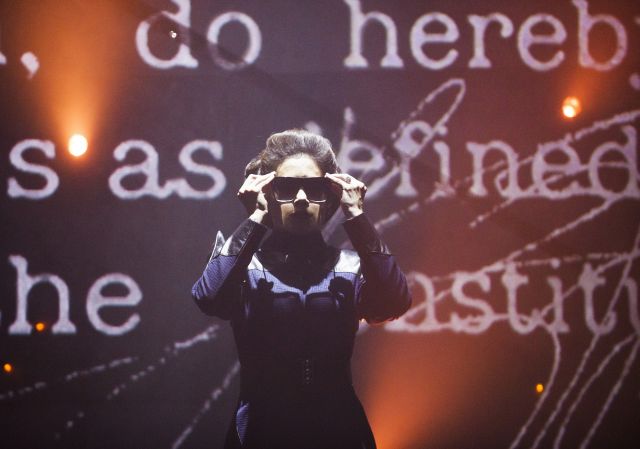Here Lies Love, National Theatre | reviews, news & interviews
Here Lies Love, National Theatre
Here Lies Love, National Theatre
David Byrne musical about Imelda Marcos offers razzle-dazzle, disco and no shoe gags

The National Theatre's new Dorfman auditorium gets off to a kick-ass start with Here Lies Love, the Off Broadway musical transplant that does for the closing months of Nicholas Hytner's tenure as artistic director what Jerry Springer the Opera did for the early days of his regime a decade or more ago.
Why disco, you ask? Because Imelda was a well-known devotee of the pulsating rhythms enshrined at long-gone venues like Studio 54, which the Dorfman - the venue known prior to its refurbishment as the Cottesloe - has been dressed up to resemble, complete with a glitter ball to match the one that our heroine reportedly had in her Manhattan townhouse. (Back in Manila, she turned the roof of the presidental palace into a dance club.) The disco beat tallies brilliantly in thematic terms as well, its sonic blast giving lift-off to the rise and rise of a small-town girl made good until such time as the aural bubble and its attendant hedonism are dramatically punctured and Imelda and her favoured music give way to something quieter and more plaintive: think Gloria Gaynor suddenly superseded by, say, Pete Seeger.
 The obvious comparison, Byrne's disavowals in various interviews notwithstanding, is with Evita, as London playgoers can assess for themselves given that the Lloyd Webber/Rice musical is currently back in the West End. Both shows chronicle the move to the big city of two variably canny if wide-eyed women who knew how to tether themselves to men in power, and in both cases we are drawn inevitably toward their drive and ambition even as we recognise what those qualities cost Argentina and the Philippines, in turn. Hell, Here Lies Love even features an 11th-hour lament, "Why Don't You Love Me?", that is a direct equivalent of Eva Peron's (Oscar-winning, since it was first written for the Alan Parker movie) "You Must Love Me". Are these musicals about saviours or sinners? You decide.
The obvious comparison, Byrne's disavowals in various interviews notwithstanding, is with Evita, as London playgoers can assess for themselves given that the Lloyd Webber/Rice musical is currently back in the West End. Both shows chronicle the move to the big city of two variably canny if wide-eyed women who knew how to tether themselves to men in power, and in both cases we are drawn inevitably toward their drive and ambition even as we recognise what those qualities cost Argentina and the Philippines, in turn. Hell, Here Lies Love even features an 11th-hour lament, "Why Don't You Love Me?", that is a direct equivalent of Eva Peron's (Oscar-winning, since it was first written for the Alan Parker movie) "You Must Love Me". Are these musicals about saviours or sinners? You decide.
In fact, just as Evita offers a corrective to our sympathies in the omnipresent figure of Che, Here Lies Love lets newsreel footage and a hurtling sense of the changing headlines mark out the ascent of the Marcoses and their subsequent slide into ignominy and exile, their evacuation in 1986 signaled by the aural overload of a chopper overhead - a quick hint here of Miss Saigon - that finds Natalie Mendoza's fiercely charismatic Imelda at once blinded and entranced by the lights: a Norma Desmond ready for her close-up to the end, not least in her insistence that she did it all "for love" (and, presumably, to feed an addiction: now 85, she has returned to political life as a congresswoman in her home country.)
Like Evita, this venture began as a concept album, moving from there to a physical production from Timbers that complements the material as effortlessly as Hal Prince's original work on that totemic British musical did back in 1978. The two-tiered staging allows those seated overhead to look down on a mosh pit of sorts whose configuration changes with every redeployment of designer David Korins's shifting platforms.
At times, pride of place is given to the chorus of fiercely drilled dancers who execute Annie-B Parsons's hypnotically alluring dance steps with a precision appropriate to a piece about the arrival of martial law. Elsewhere, the conceit allows the commanding Mark Bautista's adulterous, eventually ailing Ferdinand Marcos to buttonhole the audience directly, and if you ever wanted to have a go at line-dancing on a National Theatre stage, now's your chance (what would Jerry Springer say to that?). Indeed, among the more enthusiastic movers on press night was the Public Theatre's artistic director Oskar Eustis, here showing that he can groove with the best of them.
 You could argue, I suppose, that the musical skims the surface of the grievous trajectory inbuilt in the material, but Here Lies Love is an entertainment first and foremost and a slyly insidious one at that. Its skill lies in the same capacity for seduction that set Imelda on her path, and when that falls away to allow the people their voice, so, too, does this show find a gravitas that one might not have thought possible from its mirror-ball motif. It helps that the cast are at least the equal, and sometimes more than that, of their New York predecessors, starting with leading lady Mendoza, who moves from a heroine out of a Douglas Sirk melodrama (the connection is explicitly invoked in various projections and graphics) to someone altogether more fascinatingly feral, and there is expert support from Gia Macuja Atchison (pictured above) as a childhood friend of Imelda who gets cast adrift and Dean John-Wilson as a lover-turned-revolutionary whose life ends in tatters. By that point, the audience is itself well in thrall to a show that knows a thing or two about sweeping a public off its feet only to remind us all too pungently of what happens once the music stops.
You could argue, I suppose, that the musical skims the surface of the grievous trajectory inbuilt in the material, but Here Lies Love is an entertainment first and foremost and a slyly insidious one at that. Its skill lies in the same capacity for seduction that set Imelda on her path, and when that falls away to allow the people their voice, so, too, does this show find a gravitas that one might not have thought possible from its mirror-ball motif. It helps that the cast are at least the equal, and sometimes more than that, of their New York predecessors, starting with leading lady Mendoza, who moves from a heroine out of a Douglas Sirk melodrama (the connection is explicitly invoked in various projections and graphics) to someone altogether more fascinatingly feral, and there is expert support from Gia Macuja Atchison (pictured above) as a childhood friend of Imelda who gets cast adrift and Dean John-Wilson as a lover-turned-revolutionary whose life ends in tatters. By that point, the audience is itself well in thrall to a show that knows a thing or two about sweeping a public off its feet only to remind us all too pungently of what happens once the music stops.
rating
Explore topics
Share this article
The future of Arts Journalism
You can stop theartsdesk.com closing!
We urgently need financing to survive. Our fundraising drive has thus far raised £33,000 but we need to reach £100,000 or we will be forced to close. Please contribute here: https://gofund.me/c3f6033d
And if you can forward this information to anyone who might assist, we’d be grateful.

Subscribe to theartsdesk.com
Thank you for continuing to read our work on theartsdesk.com. For unlimited access to every article in its entirety, including our archive of more than 15,000 pieces, we're asking for £5 per month or £40 per year. We feel it's a very good deal, and hope you do too.
To take a subscription now simply click here.
And if you're looking for that extra gift for a friend or family member, why not treat them to a theartsdesk.com gift subscription?
more Theatre
 Ghosts, Lyric Hammersmith Theatre - turns out, they do fuck you up
Ten years on, Gary Owen and Rachel O'Riordan top their triumphant Iphigenia in Splott
Ghosts, Lyric Hammersmith Theatre - turns out, they do fuck you up
Ten years on, Gary Owen and Rachel O'Riordan top their triumphant Iphigenia in Splott
 All the Happy Things, Soho Theatre review - deep feelings, but little drama
New play about a sibling’s death is well imagined and deeply felt, but a bit slender
All the Happy Things, Soho Theatre review - deep feelings, but little drama
New play about a sibling’s death is well imagined and deeply felt, but a bit slender
 Shanghai Dolls, Kiln Theatre review - fascinating slice of history inadequately told
Amy Ng's take on two Chinese titans needs more dramatic ballast
Shanghai Dolls, Kiln Theatre review - fascinating slice of history inadequately told
Amy Ng's take on two Chinese titans needs more dramatic ballast
 Manhunt, Royal Court review - terrifyingly toxic masculinity
After his Olivier Award win for Oedipus, Robert Icke turns to a modern “monster”
Manhunt, Royal Court review - terrifyingly toxic masculinity
After his Olivier Award win for Oedipus, Robert Icke turns to a modern “monster”
 Midnight Cowboy, Southwark Playhouse - new musical cannot escape the movie's long shadow
Two misfits misfire in misconceived show
Midnight Cowboy, Southwark Playhouse - new musical cannot escape the movie's long shadow
Two misfits misfire in misconceived show
 Thanks for Having Me, Riverside Studios review - snappily performed comedy with a lightweight core
Writer-actor Keelan Kember floods the stage with a torrent of gags but few ideas
Thanks for Having Me, Riverside Studios review - snappily performed comedy with a lightweight core
Writer-actor Keelan Kember floods the stage with a torrent of gags but few ideas
 Rhinoceros, Almeida Theatre review - joyously absurd and absurdly joyful
Ionesco classic gets an entertainingly vivid and contemporary update
Rhinoceros, Almeida Theatre review - joyously absurd and absurdly joyful
Ionesco classic gets an entertainingly vivid and contemporary update
 The Importance of Being Oscar, Jermyn Street Theatre review - Wilde, still burning bright
Alastair Whatley honours his subject in a quietly powerful performance
The Importance of Being Oscar, Jermyn Street Theatre review - Wilde, still burning bright
Alastair Whatley honours his subject in a quietly powerful performance
 Stiletto, Charing Cross Theatre review - new musical excess
Quirky, operatic show won't please everyone, but will delight many
Stiletto, Charing Cross Theatre review - new musical excess
Quirky, operatic show won't please everyone, but will delight many
 Alfred Hitchcock Presents: The Musical, Theatre Royal Bath review - not a screaming success
1950s America feels a lot like 2020s America in this portmanteau show
Alfred Hitchcock Presents: The Musical, Theatre Royal Bath review - not a screaming success
1950s America feels a lot like 2020s America in this portmanteau show
 Wilko: Love and Death and Rock'n'Roll, Southwark Playhouse review - charismatic reincarnation of a rock legend
Johnson Willis captures the anarchic energy and wit of the late guitarist
Wilko: Love and Death and Rock'n'Roll, Southwark Playhouse review - charismatic reincarnation of a rock legend
Johnson Willis captures the anarchic energy and wit of the late guitarist

Add comment